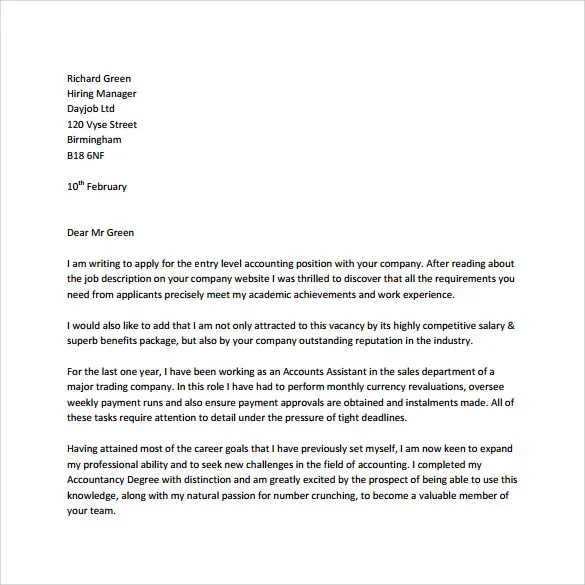What is an Entry-Level Cover Letter?
An entry-level cover letter is a crucial document submitted alongside your resume when applying for a job. It serves as an introduction to the hiring manager, providing context and highlighting your qualifications, skills, and enthusiasm for the specific position. Unlike your resume, which offers a factual overview of your experience and education, your cover letter allows you to express your personality, explain your motivations, and showcase why you’re the ideal candidate for the role, even without extensive professional experience. A well-crafted entry-level cover letter can significantly increase your chances of getting an interview, especially when you’re just starting your career. It’s your chance to make a strong first impression and demonstrate your written communication skills, attention to detail, and genuine interest in the opportunity.
The Importance of a Cover Letter for Entry-Level Positions
While a resume provides a snapshot of your qualifications, an entry-level cover letter allows you to connect with the hiring manager on a more personal level. For entry-level positions, where candidates may have limited professional experience, a compelling cover letter is even more critical. It enables you to explain any gaps in your experience, highlight relevant skills gained through internships, volunteer work, or academic projects, and demonstrate your eagerness to learn and contribute to the company. Your cover letter is your opportunity to show that you’re more than just a list of accomplishments; it’s a chance to convey your personality, work ethic, and genuine interest in the specific role and company. A well-written cover letter can set you apart from other applicants and significantly increase your chances of securing an interview, even if your resume doesn’t boast years of experience.
Key Components of an Effective Entry-Level Cover Letter
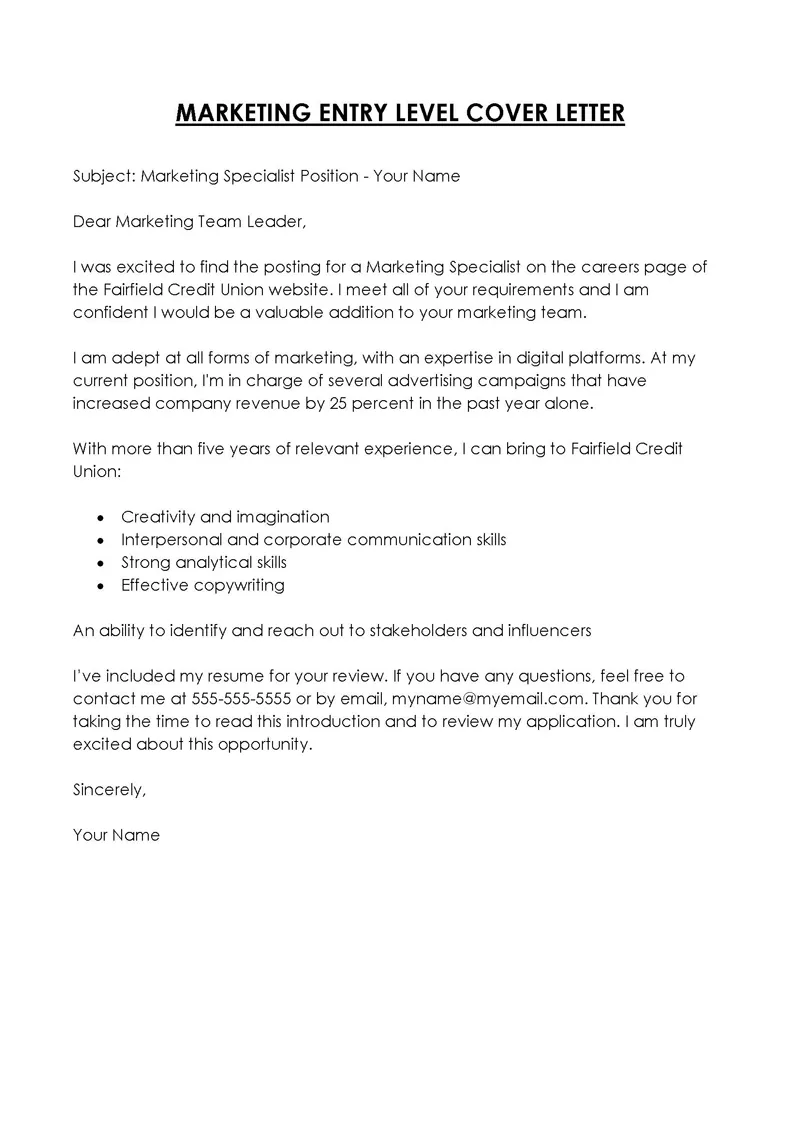
A successful entry-level cover letter consists of several key components that work together to make a strong impression. These elements include clear contact information, a professional salutation, a compelling opening paragraph, a section highlighting your relevant skills and experiences, a demonstration of your educational background, and a strong closing with a clear call to action. Each part of the cover letter serves a specific purpose, and when crafted thoughtfully, they collectively showcase your qualifications and express your enthusiasm for the position. It’s important to tailor each section to the specific job requirements and company culture, making sure your cover letter is not a generic document but a personalized introduction that captures the attention of the hiring manager and encourages them to read your resume and invite you for an interview.
Contact Information and Date
At the top of your cover letter, include your contact information: your full name, phone number, email address, and optionally, your LinkedIn profile URL. This allows the hiring manager to easily reach you if they want to schedule an interview or offer you the job. Below your contact information, add the date. This simple detail demonstrates that you are organized and professional.
The Salutation
Begin your cover letter with a professional salutation. If possible, address the hiring manager by name; research the company website or LinkedIn to find the name of the person who will be reviewing applications. A personalized salutation, such as “Dear Mr./Ms. [Last Name],” shows that you’ve taken the time to research and personalize your application. If you can’t find a specific name, use a general greeting such as “Dear Hiring Manager,” or “Dear [Department Name] Team.” Avoid generic greetings like “To Whom It May Concern,” which can make your letter seem impersonal.
Crafting a Compelling Opening Paragraph
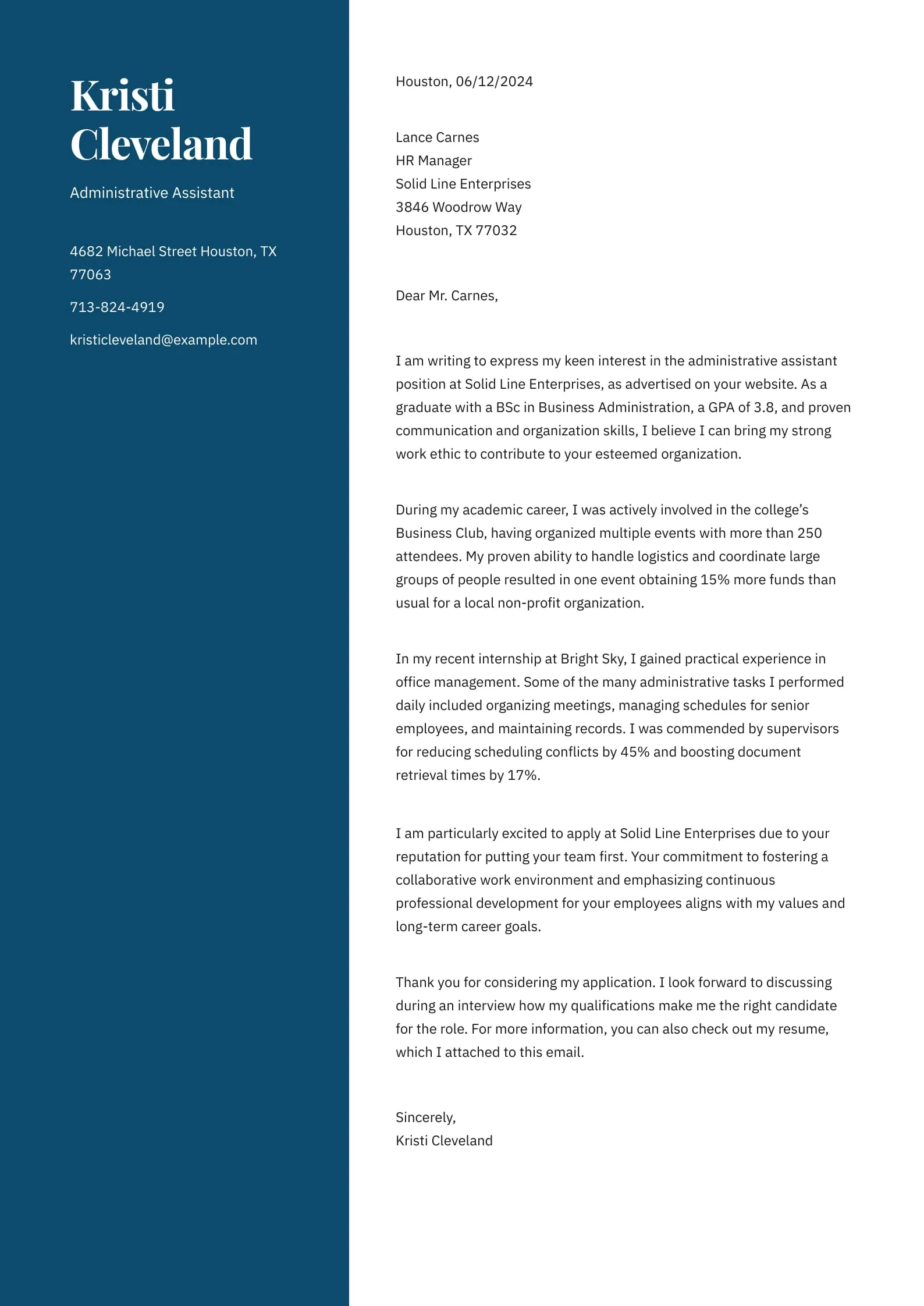
Your opening paragraph should immediately grab the reader’s attention and make them want to learn more about you. State the position you are applying for and how you found the job listing (e.g., “I am writing to express my interest in the Marketing Assistant position advertised on [website name]”). Briefly mention something that sparked your interest in the role or company to show you understand the company’s mission and values. Highlight your key skills or experiences that make you a great fit. Make it clear you are enthusiastic about the opportunity and express your genuine desire to contribute to the company’s success. This first paragraph should be concise, engaging, and set the tone for the rest of the letter.
Highlighting Relevant Skills and Experiences
The main body of your cover letter should highlight your relevant skills and experiences. Analyze the job description carefully and identify the key skills and qualifications the employer is seeking. Provide specific examples of how you’ve demonstrated these skills in your past experiences, whether through internships, volunteer work, academic projects, or part-time jobs. If you have limited work experience, focus on transferable skills like communication, teamwork, problem-solving, and time management. Use the STAR method (Situation, Task, Action, Result) to structure your examples, providing context, explaining your role, detailing the actions you took, and highlighting the positive outcomes. This approach allows you to demonstrate your skills effectively and provide concrete evidence of your abilities.
Showcasing Educational Background
For entry-level positions, your educational background is often a significant factor. Briefly describe your degree, major, and any relevant coursework. Mention any academic achievements, such as Dean’s List, scholarships, or honors, that showcase your dedication and abilities. If your coursework directly relates to the job requirements, emphasize these aspects. For instance, if applying for a marketing role, highlight courses like marketing principles, digital marketing, or consumer behavior. Similarly, if you have relevant projects or theses from your academic studies, briefly describe them and how they have prepared you for the position. If you’ve participated in relevant extracurricular activities or student organizations, mention them to demonstrate your well-roundedness and engagement.
Quantifying Achievements (If Possible)
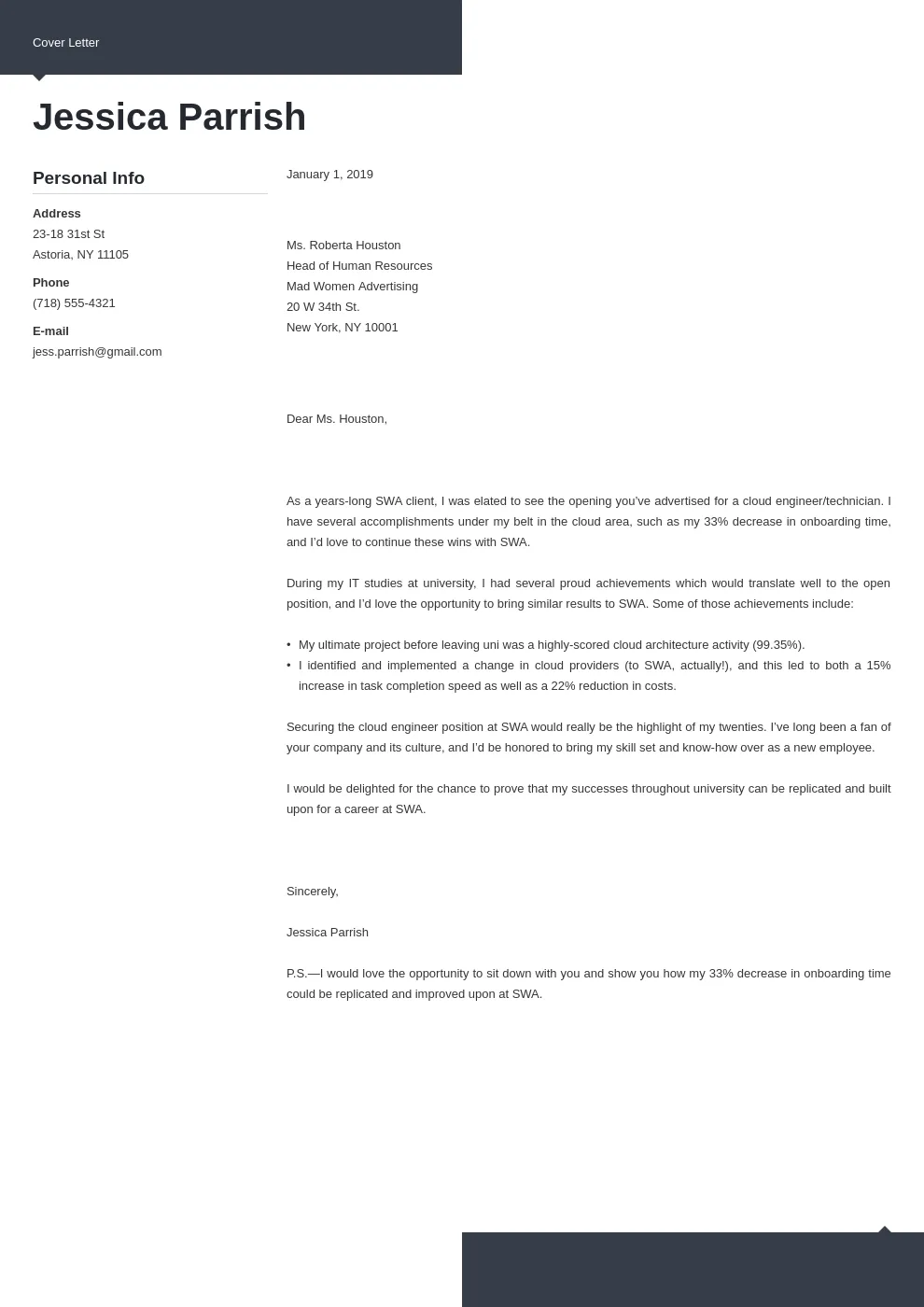
Whenever possible, quantify your achievements to demonstrate your impact. Instead of saying, “I improved customer service,” say, “I improved customer satisfaction scores by 15% through implementing a new communication strategy.” Use numbers, percentages, or specific data to showcase your accomplishments. For instance, if you volunteered for an organization, state how many hours you contributed or the number of people you helped. If you worked on a project, mention any positive results achieved. Quantifying your achievements makes your cover letter more impactful and demonstrates that you’re results-oriented and capable of making a difference. Numbers provide concrete evidence of your abilities and set you apart from candidates who provide vague descriptions.
Demonstrating Enthusiasm for the Role and Company
Throughout your cover letter, express your genuine enthusiasm for the role and the company. Show that you’ve researched the company, understand its mission and values, and are excited about the opportunity to contribute. Mention specific reasons why you’re interested in working for that particular company. Refer to the company’s recent projects, achievements, or news stories to demonstrate your knowledge and interest. Your enthusiasm will show the hiring manager that you’re not just looking for any job; you genuinely want to work for their organization. This will make you a more memorable candidate and significantly increase your chances of getting an interview. Demonstrate how your skills and aspirations align with the company’s goals.
Writing a Strong Closing Paragraph
In your closing paragraph, summarize your key qualifications and reiterate your enthusiasm for the position. Express your interest in an interview and thank the hiring manager for their time and consideration. State your availability for an interview and provide your contact information once more. Avoid clichés like “I look forward to hearing from you.” Instead, use a proactive and confident tone, such as “I am eager to discuss my qualifications further and am available for an interview at your earliest convenience.” Always end with a professional closing such as “Sincerely,” or “Best regards,” followed by your full name.
The Call to Action
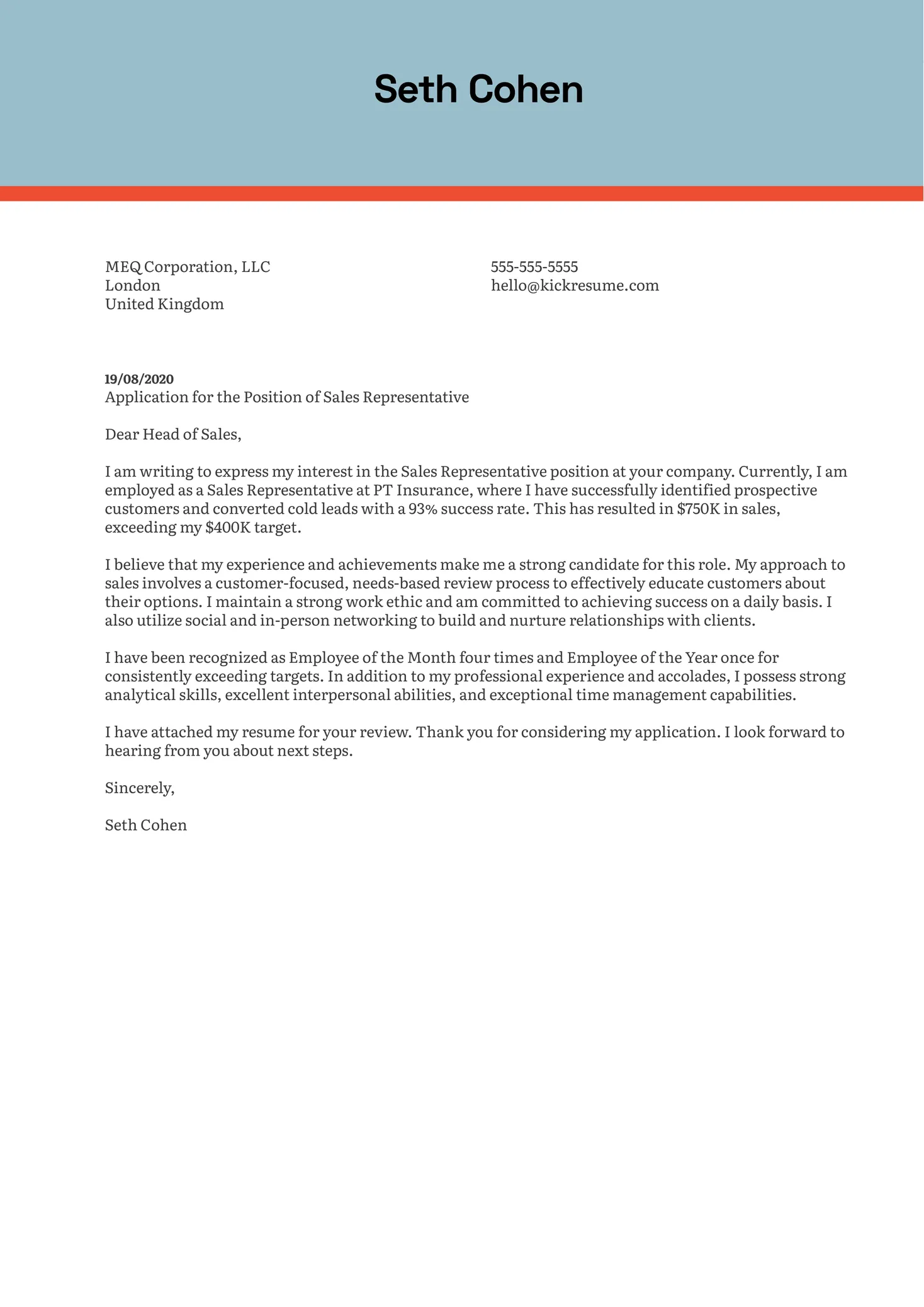
Include a clear call to action to encourage the hiring manager to take the next step. Express your interest in an interview and make it easy for them to reach out. Provide your contact information again in the closing paragraph and reiterate your enthusiasm for the opportunity. A strong call to action shows that you are proactive and eager to move forward in the hiring process. Make it easy for the hiring manager to contact you to discuss your qualifications and schedule an interview.
Formatting and Proofreading Your Cover Letter
Proper formatting and careful proofreading are essential to make a professional impression. Your cover letter should be easy to read, free of errors, and visually appealing. Errors can undermine your credibility and make you seem less competent. This section covers how to format and proofread your cover letter to increase your chances of success.
Formatting for Readability
Use a professional and readable font, such as Times New Roman, Arial, or Calibri, with a font size of 11 or 12 points. Use one-inch margins on all sides. Left-align your text; avoid justifying the text as it can create uneven spacing. Separate paragraphs with a line break to improve readability. Keep your cover letter concise, ideally one page, unless the job posting specifically requests otherwise. Use clear and concise language. Ensure that your cover letter is well-organized with clear sections and headings, making it easy for the hiring manager to find the information they need.
Proofreading for Errors
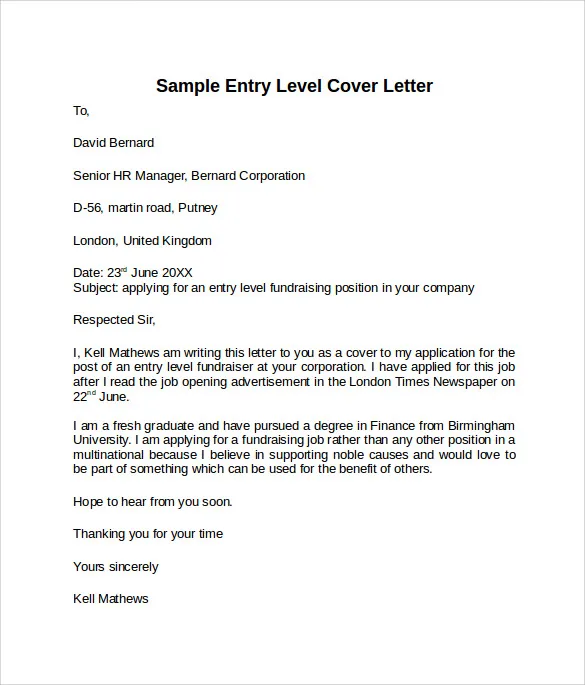
Thoroughly proofread your cover letter to catch any errors in grammar, spelling, and punctuation. Use a spell checker, but don’t rely on it entirely; it won’t catch all errors. Read your cover letter aloud to hear any awkward phrasing or mistakes. Ask a friend, family member, or career counselor to review your cover letter for a fresh perspective. Different readers can often spot mistakes that you might overlook. Correct all errors before submitting your application; a cover letter with errors suggests a lack of attention to detail and professionalism, which can be a reason for rejection.
Common Mistakes to Avoid in Your Entry-Level Cover Letter
Avoiding common mistakes can dramatically improve your chances of getting an interview. These errors can make you seem unprofessional, unprepared, and not genuinely interested in the position. Here are the most common mistakes to avoid.
Generic Content
Avoid using a generic cover letter that you send to multiple companies without any personalization. Customize each cover letter for the specific job and company you are applying to. Tailor your content to match the requirements outlined in the job description, and research the company to showcase your understanding of its mission, values, and recent activities. Demonstrate your genuine interest in the role and how your skills and experiences align with the company’s goals. Generic cover letters show a lack of effort and attention to detail and reduce your chances of getting an interview.
Typos and Grammatical Errors
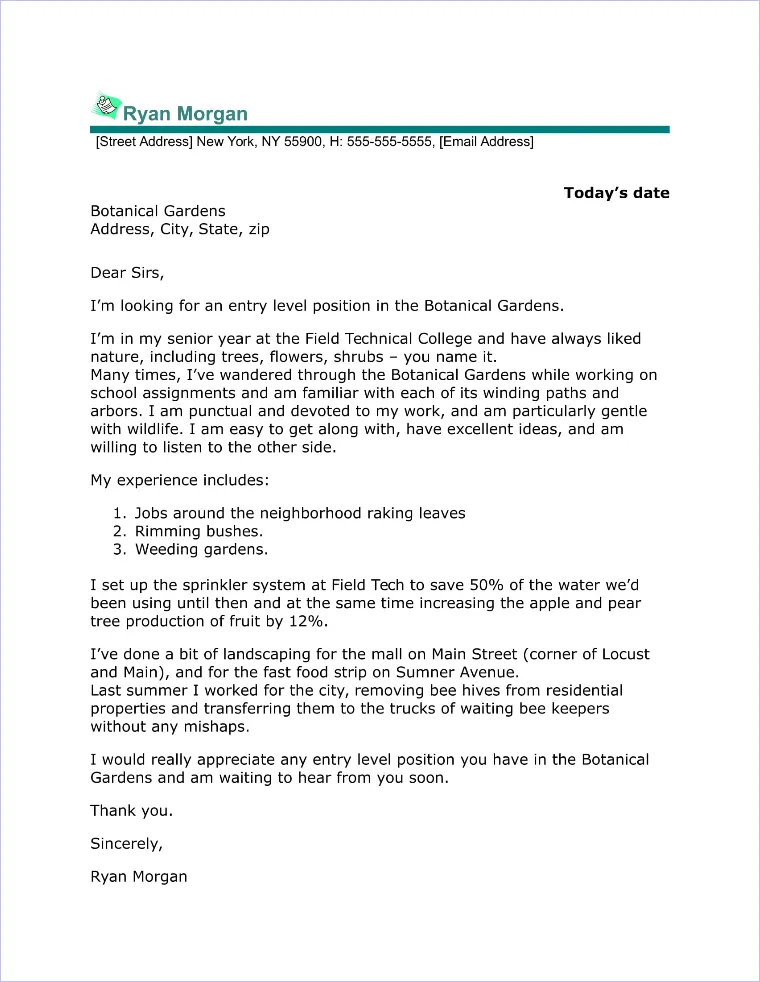
Typos and grammatical errors can undermine your credibility and professionalism. Proofread your cover letter carefully, and use a grammar checker to catch mistakes. Read your cover letter aloud to hear any awkward phrasing or errors you might have missed. Ask a friend, family member, or career counselor to review your cover letter. Make sure to have a clear and concise writing style. A cover letter with errors indicates a lack of attention to detail and can lead to your application being rejected.
Ignoring the Job Description
Carefully read the job description and tailor your cover letter to address the specific requirements and qualifications outlined. Highlight the skills and experiences that align with the job’s needs and use keywords from the job description to demonstrate you are a great fit. Your cover letter should be a response to the job description and should demonstrate how your skills and background meet the employer’s needs. Ignoring the job description shows that you are not attentive to detail and that you have not invested the time to apply properly.
Overly Formal Tone
While maintaining a professional tone is important, avoid being overly formal or using overly complex language. Write in a clear, concise, and engaging style. Use active voice and avoid jargon or overly technical terms that the hiring manager may not understand. Make your cover letter easy to read and conversational. This helps the hiring manager get to know you and understand your enthusiasm for the role. This approach can make your cover letter more approachable and memorable.
Tailoring Your Cover Letter to Different Job Types
Your entry-level cover letter should be tailored to the specific type of job you’re applying for. The focus and content of your letter will vary depending on whether you’re applying for an internship, a part-time job, or a full-time position. Adapt your letter to highlight the most relevant aspects of your experience and to address the specific requirements and expectations of the job.
Example Cover Letter for Internship
When applying for an internship, focus on your academic achievements, relevant coursework, and any projects or extracurricular activities that demonstrate your skills and knowledge. Showcase your eagerness to learn and your enthusiasm for the field. For instance, if you are applying for a marketing internship, highlight your knowledge of social media, content creation, and marketing principles from your marketing courses. If you’ve participated in a marketing-related project, briefly describe your role and the results you achieved. Demonstrate your interest in the company and explain how an internship would help you gain practical experience and develop your skills. Your goal is to show that you are a motivated, eager learner and a valuable asset to the team.
Example Cover Letter for Part-Time Job
For a part-time job, emphasize any previous work experience, even if it’s in a different field. Highlight transferable skills such as customer service, communication, teamwork, and time management. If you have volunteered or participated in extracurricular activities, mention them to demonstrate your work ethic and ability to handle multiple commitments. If applying for a retail position, for example, highlight your customer service skills and your ability to handle cash and sales transactions. Express your availability and your commitment to meeting the job’s requirements. Your goal is to show that you are reliable, responsible, and capable of performing the job duties effectively.
Example Cover Letter for Full-Time Job
When applying for a full-time job, focus on your educational background, internships, and any relevant work experience. Highlight how your skills, education, and experience align with the job requirements. If you have limited work experience, emphasize the skills you have gained through academic projects, internships, or volunteer work, and quantify your achievements whenever possible. Explain how you can contribute to the company’s success and express your long-term career aspirations. Show that you are committed to the company’s mission and values, and that you are looking for a long-term career opportunity. Your goal is to demonstrate that you are a well-prepared, capable, and enthusiastic candidate ready to begin your professional career.
Final Tips for Entry-Level Cover Letter Success
Creating a compelling entry-level cover letter is key to landing a job interview. Follow these final tips for success: Research the company and tailor each cover letter to the specific job and company. Highlight your relevant skills and experiences, even if limited, and demonstrate your enthusiasm for the role. Proofread carefully for errors in grammar, spelling, and punctuation. Use a clear and concise writing style, and quantify your achievements whenever possible. Express your genuine interest in the company and the position. Include a clear call to action to encourage the hiring manager to contact you for an interview. By following these tips, you can create an effective entry-level cover letter that will increase your chances of landing your first job and launching a successful career.
